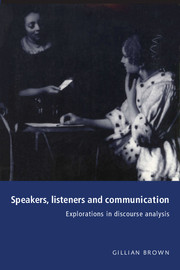Book contents
- Frontmatter
- Contents
- Acknowledgements
- Transcription conventions
- Introduction
- 1 Speakers, listeners and communication
- 2 The Map task method
- 3 Identifying features in a landscape
- 4 Guiding the listener through the landscape
- 5 The Stolen letter task: understanding reference to individuals in a narrative
- 6 Understanding narratives
- 7 The listener and discourse comprehension
- Epilogue
- References
- Index
6 - Understanding narratives
Published online by Cambridge University Press: 05 June 2012
- Frontmatter
- Contents
- Acknowledgements
- Transcription conventions
- Introduction
- 1 Speakers, listeners and communication
- 2 The Map task method
- 3 Identifying features in a landscape
- 4 Guiding the listener through the landscape
- 5 The Stolen letter task: understanding reference to individuals in a narrative
- 6 Understanding narratives
- 7 The listener and discourse comprehension
- Epilogue
- References
- Index
Summary
We have repeatedly raised the question of what, in the Stolen letter task, constitutes the equivalent of the search field in the Map task. In chapter 4, we noted that deictic expressions play a potentially crucial role in situating the listener so that the listener adopts the same perspective on the search field as the speaker. We saw in chapter 3 how listeners who failed to locate themselves in the same vantage point as the speaker failed to understand adequately what the speaker said. Does deixis perform the same central role in the narrative task as it did in the spatially structured task? If so, is temporal deixis the crucial element here?
This chapter begins by laying out the broad outlines of the temporal structures which are referred to by subjects who undertake the Stolen letter task. I move on to examine how temporal deixis plays a part in restricting the contextual search field for the listener and how this interrelates with person/entity deixis. I then consider the part played by spatial deixis and person/entity deixis. Finally, I discuss how the Map task search field, viewed from a particular anchor point, can be related to the Stolen letter task search field and in this context I examine the function of what Fauconnier (1985) calls ‘space-builders’.
Before we turn to consider the use of deixis in the narrative Stolen letter task, we should briefly recall the use of deixis in the spatially structured Map task. In chapter 4, we noted the extensive use of spatial deictic expressions used to guide the listener through the landscape.
Information
- Type
- Chapter
- Information
- Speakers, Listeners and CommunicationExplorations in Discourse Analysis, pp. 168 - 200Publisher: Cambridge University PressPrint publication year: 1995
